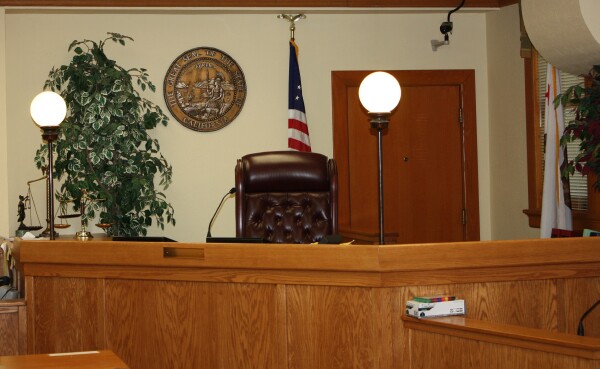 We spend a lot of time talking about the district attorneys on these pages, but just as important are the judges. Most of the time, the judges are sitting back and making their legal rulings. However, these rulings profoundly shape the cases and the evidence admitted.
We spend a lot of time talking about the district attorneys on these pages, but just as important are the judges. Most of the time, the judges are sitting back and making their legal rulings. However, these rulings profoundly shape the cases and the evidence admitted.
Most of the time judges are restrained, but occasionally you see in them glimpses of their true spirit. It was thus as the first of the closing statements were wrapping up in the never-ending Niazi trial that we got just such a glimpse into Judge Stephen Mock.
As the jurors filed out of the jury box, across the well of the courtroom, turning past the public area and through the short narrow passage that leads to the exit of the courtroom, a young lady who had been seated in the public viewing area was walking the opposite way through the group of jurors.
She is a relative of one of the defendants and was walking towards the defendants to speak with them during the break. As this lady was passing juror number two, they looked at one another and smiled .
Juror number two, also a young lady with a warm and pleasant demeanor, commented that it was a lot of information that they had just heard, most likely referring to the closing argument that had just concluded. The young lady replied that yes it was. They passed each other and kept going their own ways.
As the proceedings were set to resume, Judge Mock came out of his chambers, walked across the floor of the court to the threshold where the public sits.
He stood facing the two or three members of the public and explained that the bailiff had informed him that, as the jurors were leaving for the ten-minute break, a member of the public had interacted with one of them. Though he noted that the individual in question was not present in the courtroom at that time, he continued with what he had to say.
In a stern tone he stated that jurors are not to be spoken with under any circumstances. He said that it risks a mistrial and creates the prospect of having to conduct the entire trial again from the very beginning.
He said that if he hears again of any such contact with jurors, that he will have the courtroom closed and will conduct the rest of the trial outside of public access. He said to the observers that if they care about justice in this case that they would not speak to any jurors under any circumstances.
After this, the jury was brought in again and Judge Mock advised them that since there was little time left in the day, that the following closing argument would being at 9:00 AM the following morning and that by some point tomorrow afternoon, after the remainder of the closing arguments were heard, the jury would be sent to deliberate the case. With that, he sent the jury home.
Notably absent from the judge’s comments to the jury at that point was any utterance of an instruction against discussing the case with anyone. Given that the judge had admonished the public about contact with the jury, it would seem a wise precaution to remind the jury of that instruction at this time.
More generally, having seen the numerous trials that we have before Judge Mock, there is a marked absence of repeated reminders to his juries about not discussing the case, that would serve to keep the instruction fresh in their minds. By contrast, at the other end of the building, the juries of Judge Timothy Fall are doggedly reminded on every single occasion before they leave the courtroom that they are not to discuss the case with anyone under any circumstances, that they are not to form any opinions until they have heard all the evidence.
Judge Mock, beyond an instruction at the beginning of a trial, does not remind his juries of this rule. This invites natural complacency which is to be expected, especially during a trial of twenty days, that is in its fourth week now.
Nevermind that the Judge was addressing people who had nothing to do with the transgression. Nevermind he failed to recognize that the juror had approached the audience member, not the other way around.
But most particularly, his threat of banning the public from the courtroom raises all sorts of red flags. That should be the response of last resort, not the first threat that a Judge makes. It should not be taken lightly.
We can contrast this with the December actions of Judge Fall in the Galvan trial.
When Deputy DA Carolyn Palumbo launched into a quasi-tirade decrying the bloggers who are blogging on so many blogs about this case and asking that the Judge clear the chambers to hear something out of the range of the jury, Judge Fall did not even blink.
He carefully weighed the evidence and the need to go into private, and saw clearly that there was no reason to do so. He even lectured the Deputy DA on the need for the public to be able to watch court proceedings and the importance of the Bill of Rights.
Given the fallout back in 2008 from closing the courtroom in the Topete arraignment to reporters and the public, one would think Judge Mock would be more cautious. Alas, based on an incomplete account of what happened, he made a threat to close the courtroom to the public.
Judge Fall, to his credit, understood the importance of a public trial and that was the last thing he was about to do. Judge Mock made the threat far too quickly.
Barring the public is an extreme measure that should be considered in an extreme situation.
Here, a young lady, without harmful intent, interacted with a juror. The judge should have instructed her in particular, as well as the rest of the public in attendance.
Given that she was a relative of the defendants, the bailiff could have easily located her, and she actually happened to be waiting outside on the steps of the courthouse. That would have been a more appropriate remedy. A reminder to the jury would have also been appropriate here.
Given that the juror in this case also wholeheartedly interacted with the visitor, it should be an indicator to the judge that he has not done a sufficient job of explaining to the jury exactly what it is that is not allowed.
—David M. Greenwald reporting





Members of the public should remain seated until the jury exits. It is correct that the public should not interact with the jury. Jury members are instructed not to discuss the case with anyone and are smart enough to remember this on a day to day basis. Members of the public should also be aware of this and not engage in conversation with the jury, especially IN THE COURTROOM.
To Ryan Kelly: Well said.
Experienced judges often become complacent about their dealings with juries, particularly during lengthy trials and judges are just as concerned about their rapport with juries as lawyers are. The admonition not to talk to others about the case is often given in a truncated version by stipulation of the parties, but should never be completely ignored and should be given in full at the end of each court day. You do the community a service by bringing to light something that would go unnoticed otherwise.
A difference between these two Judges to note is Judge Mock’s wife was the number two at the DA’s office under Reisig. I think she still works part-time at the DA’s office. I also think Judge Mock was a prior DA.
It is not uncommon for Prosecutors to get an ego or “God complex” and think they are some how special and the rules and laws don’t apply to them. Working with mainly crooks every day and deciding people’s lives and freedoms can remove the reality of the impact you have over time. Treating people with dignity and respect is not part of their job description since they see most as guilty and just a job.
I agree with rulysses that this would have gone unnoticed without the attention you’ve given to it. And I agree with Ryan and Elaine that public observers need to be made aware that they shouldn’t be talking to jurors, particularly if the rule’s just been violated.
Judge Mock’s admonition about the seriousness of observer communications with jurors seems totally appropriate for the situation. His Honor certainly doesn’t need a lecture on the importance of open trials, a point that was reinforced by using courtroom closing as the ultimate possibility to avoid an unfair trial. Does the judge have any history suggesting he doesn’t agree with you that “barring the public is an extreme measure that should be considered in an extreme situation”?
I’d rather the bailiff be in the courtroom, not running out to the street hoping to find someone (even a defendant’s relative) who said “yes, it is….” to a juror. Bailiffs should be trying to keep the trial participants protected from interlopers [u]inside[/u] the courtroom. In my experience, bailiffs would be trying to keep the defendant’s relative or anyone else from “walking the opposite way through the group of jurors”–as well as be reminding jurors not to be talking to others about the case–as they head to the jury room. [quote]“Alas, based on an incomplete account of what happened, (the judge) made a threat….”
“As this lady was passing juror number two, they looked at one another and smiled….also a young lady with a warm and pleasant demeanor, commented that it was a lot of information that they had just heard, most likely referring to the closing argument that had just concluded. The young lady replied that yes it was.”
“Judge Mock, beyond an instruction at the beginning of a trial, does not remind his juries of this rule.”[/quote] Don’t you think these comments overstate and claim observations that don’t appear to be ones you could have been in place to make, at least not to the degree you’re claiming?
[quote]“A difference between these two Judges to note is Judge Mock’s wife was the number two at the DA’s office under Reisig….It is not uncommon for Prosecutors to get an ego or ‘God complex’ and think they are some how special and the rules and laws don’t apply to them….Treating people with dignity and respect is not part of their job description since they see most as guilty and just a job.”[/quote]Here you go again, Roger Rabbit. Is there no [u]Vanguard[/u] story you won’t twist into yet another opportunity for your on-going gratuitous personal attacks on DA Reisig’s character?
I’d hoped your vitriol would become more tempered, but it continues unabated. I’m a little curious what’s brought you to such a hatred of our DA as a person (rather than to any actions he takes or the statement he makes). It must be a serious affront that drives you to such abusive ad hominems whenever David does a “Judicial Watch” story.
lol, justsaying: I was not directing this just to just DA Reisig. All DA’s get ego and arrogant, much like some cops do, or fighter pilots, military, Doctors and other high risk and power professions. Ask any lawyer, they will be the first to tell that “the black robe” Judges, change the second they put the robe on and it is not normally for the better. I happen to think both Judge Mock and Fall do good jobs and their intent and hearts are in the right place, it does not mean I agree with them all the time.
I make no bones about my beliefs and opinion of Mr. Reisig, he is lower than the belly of a snake and I have far too many examples of his cowardliness and lack of character to list. And it does not matter what I would say, people who want to believe would and those that did not want to believe would not. I learned long ago not try and get people to agree, since frankly I don’t care.
People need to make their own opinion on what they know. I based mine on what I know and I don’t try and convince people to believe something they do not want to believe. I do state my opinion, “Just like you”. I guess the difference is I don’t try and attack your opinion or try and make you justify it to me.
Here is a news flash, Not everyone likes DA Reisig and he is not super special just because he holds office. My litmus test of a man is a little deeper than just being a lawyer or a good politician.
I agree that members of the jury ought to exit first and members of the public should remain in their seats until the jury leaves. Unfortunately that requires guidance from the Judge and Sheriff’s Deputies to play out correctly and while Judge Mock was quick to yell at people who had not transgressed, he has not be proactive in addressing the issue.
or What Its Worth
I have served on a jury on two occasions, once as a foreman. I remember each judge clearly emphasizing the need for jurors to not discuss the case with non-jurors outside of the courtroom. Because the instructions to the seated jurors were clear at the beginning of each trial and were enforced during both trials, we self-policed effectively without constant reminders. Is the frequency of reminders really a problem?
RK,
“Jury members are instructed not to discuss the case with anyone and are smart enough to remember this on a day to day basis.”
Evidenced by this case, some are obviously not or are just forgetful. Hence, the need to remind them.
RR,
“My litmus test of a man is a little deeper than just being a lawyer or a good politician.”
Has anyone here given you the impression that an individual’s education or elected position is the sole measure for which one’s character (ie being a “man”) is or should be tested?
I think most on this site are pretty objective and their opinions unswayable by degrees and titles. That’s my opinion anyway.